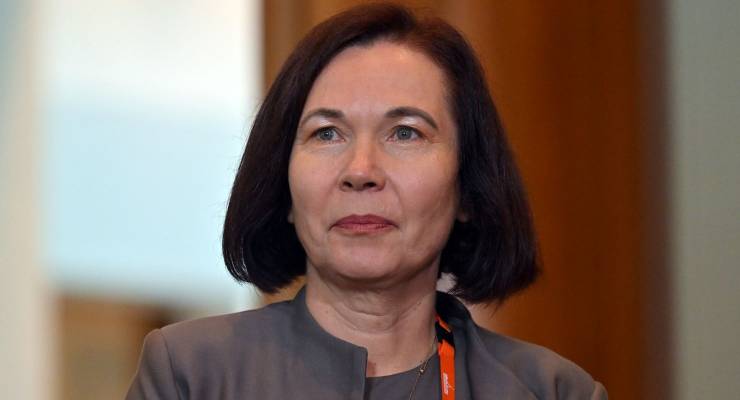
Yesterday two of Australian economics’ éminences grises, Ross Garnaut and Rod Sims, rose at the National Press Club to outline a plan to fund Australia’s renewables transition and lift our productivity performance. According to Sims and Garnaut (there’s another cop show I’d pay good money to watch), “Australia’s full participation in the world’s move to achieve net zero global emissions is the only credible path to restoring productivity growth and rising living standards.” Among their recommendations was a “Carbon Solutions Levy (CSL) at all fossil fuel extraction sites” to generate revenue for decarbonisation.
Needless to say, the fossil fuel lobby was not impressed. Tania Constable of the Minerals Council of Australia, which represents the likes of Anglo American, Glencore, Peabody Energy, Whitehaven Coal and Yancoal, promptly issued a media release.
“Today’s proposal from the Superpower Institute to impose an additional tax on Australian industry would seriously undermine our international competitiveness and result in jobs losses across the country,” Constable said. “The climate wars are over. Australia already has a framework in place which was designed to be agnostic about the source of emissions.”
That induced a genuine double take at Crikey. “The climate wars are over”? Coming from one of the primary sources of climate denialism over the last three decades?
So we thought we’d check the ways in which the Minerals Council thinks the climate wars are over.
Is it in regard to Labor’s now-legislated safeguard mechanism, which is now the primary means of ratcheting down the CO2 emissions of our worst polluters? The MCA tried to sabotage that by demanding a cap on how much polluters would have to pay if they failed to reduce their emissions, allowing polluters to pick the baselines against which they’d be assessed and pausing any reduction in baselines if “technology solutions” weren’t available. The council was one of more than 60% of industry lobby groups and corporations that opposed the scheme.
In January the MCA said the government should amend the safeguard mechanism to prevent state-based emissions schemes from affecting polluters, and called for taxpayer funding for the carbon capture and storage scam, a favourite delay mechanism of the fossil fuel lobby.
In November the MCA used another delay tactic, and called for nuclear power in Australia (you’ll never guess, “small modular reactors”), ignoring the decades it would need to become established and the tens of billions of dollars it would cost. In May last year, the MCA again backed carbon capture. In 2022, the MCA even criticised Labor’s legislation of its emissions reductions election commitment — despite its profession to support it — because we can’t have policy reform that drives businesses to reduced production or closure due to an inability to compete with competitor countries who are not implementing strict emissions constraints on their export industries. That is, the emissions reduction target should only be implemented to maintain business as usual.
The MCA has constantly said it has “a strong commitment to climate action, supporting the Paris Agreement and an industry ambition of net zero by 2050.” But its commitment to climate action is like that adopted by another big business lobby, the Business Council of Australia: say that you support climate action, but work to sabotage any policy that would meaningfully undertake climate action. Say one thing, do another. Emblazon your support for climate action across your website, but constantly agitate for amendments that will neuter meaningful policy, and push scams and delay mechanisms.
Not for nothing did the MCA celebrate Gina Rinehart (quick, 150, send us a trademark letter!) last year. Rinehart thinks climate change isn’t caused by humans.
The climate wars ain’t over. Not by a long shot. They’re just being fought in less high-profile ways.








The guests at the national press club were a breath of fresh air and common sense. Not only should the fossil fuel companies pay very much increased taxes, they should also pay for remediation of all the communities destroyed by the climate change which they have caused. It will have to happen somehow.
Increased taxes would put up prices, so I would prefer that the money be handed back to consumers, making it cost neutral. While at the same time penalising FF and encouraging RE.
Applying a carbon tax “at all fossil fuel extraction sites” is exactly where it should be applied. At any other level in the carbon economy a carbon tax could be politically wheedled, diluted and cheated. Yes, it could be rebated on export, but Aust too should be joining the call for a universal tax on traded carbon.
Along with the list of double-handed actions from the MCA, you might have wanted to add contributing generously (but not always obviously) to anti-renewable, pro-fossil fuel advocacy groups.
That’s their job. It’s what they do. They’re paid by the FF producers – it’s a zero-conscience industry.
FF producers – it’s a zero-conscience industry
The ultimate in nihilism.
It’s all too damn late any way. Reports now that we’ve already exceeded 1.5%C and I have no doubt in my mind that we’ll exceed 2%C before the 2050s. I won’t be around but our kids will reap the whirlwind, not that either party in this country gives a flying fig!
The climate wars are over, says a fossil fuel lobby. At first I thought that was unconscious self-satirization (if there’s such a thing), but then realised, no, what they mean is get out of the way while we try our best to pump our carbon pollution into a hole in your back yard while you pay for the privilege. Its heartening to see them so selflessly fighting that modern evil of nimbyism.
The climate wars are set to be revived.. say the exclusive in Australian. They want coal power to be extended until nuclear can be brought online..?